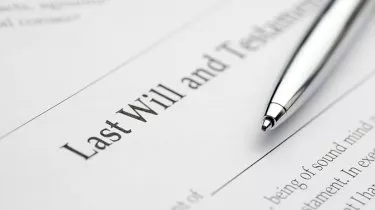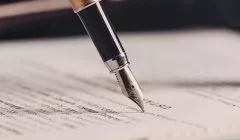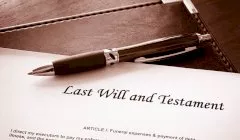Retirement
What is probate?
The process of probate is not always easy to navigate – but what is it exactly? A lawyer explains.
What is probate?
The process of probate is not always easy to navigate – but what is it exactly? A lawyer explains.

In its simplest terms, probate is the validating of a will, writes Brian Hor, special counsel and superannuation and estate planning expert at SUPERCentral.
Probate is needed to determine that an individual’s will is actually the valid and last will of the person in question.
According to Mr Hor, without probate, institutions such as banks, share registries and the like cannot be satisfied as to who has the correct authority to receive a deceased person’s assets and may therefore refuse to pay out.
“Obtaining a Grant of Probate is generally necessary if the deceased held assets in their name only or jointly with other parties as tenants in common,” he outlined, with many third parties holding or controlling estate assets requiring a copy of the probate document prior to releasing certain assets or payments.

These may include payments such as bank deposits, insurance payouts, or aged care accommodation bonds.
Every estate is likely to go through the process of a Grant of Probate – it requires the Supreme Court in each state to be provided with information about the assets and liabilities of an estate, the deceased person, the witnesses to the will, the executors, as well as the will itself.
But there are several exceptions.
Mr Hor said, “Sometimes, for smaller estates or if assets are mostly jointly owned with a surviving spouse, asset holders might agree to release payment without requiring a Grant of Probate.”
This is usually on the basis that the person receiving the payment promises to repay or indemnify the asset holder if it turns out the wrong person was paid.
Probate is also not able to be granted in instances where there is no will – in this circumstance, Mr Hor said Letters of Administration are obtained.
“This is effectively the same, in terms of authorising someone to administer the estate, and would usually be obtained by the person who is the closest next of kin to the deceased,” the expert indicated.
About the author

About the author


Estate planning
Turning inheritance into impact: The once-in-a-generation opportunity facing Australian families
Australia is on the brink of a seismic shift in wealth distribution, with more than $3.5 trillion expected to be transferred from Baby Boomers to Gen X and Millennials in the next two decades. This ...Read more

Estate planning
Australians encouraged to review their estate plans
Individuals should make sure their current estate plan is up to date. Read more

Estate planning
Why would a person want to set up a trust?
Why would a person want to set up a trust? We list down the reasons that may motivate you to call your attorney today. Read more

Estate planning
Will v trust: Which is best for you?
Should you create a will or a trust? Learn about their differences to know which is the best option for your estate planning. Read more

Estate planning
Executor of will and power of attorney: What’s the difference?
What is the difference between an executor of will and power of attorney? Let’s discuss their roles and why they are both important tools in estate planning. Read more

Estate planning
When is the best time to start estate planning?
One of the biggest misconceptions about estate planning is that you should start developing one only when you’re old. We discuss why you should create one as soon as you can. Read more

Estate planning
Advisers warned on limitations with life expectancy estimates
Jeremy Cooper has highlighted some of the limitations in using average life expectancies when planning retirement income for individual SMSF clients. Read more

Estate planning
Deadly estate planning mistakes and how to overcome them
Estate planning can be a complex process. Here are some of the mistakes you should avoid when getting your affairs in order. Read more

Estate planning
Turning inheritance into impact: The once-in-a-generation opportunity facing Australian families
Australia is on the brink of a seismic shift in wealth distribution, with more than $3.5 trillion expected to be transferred from Baby Boomers to Gen X and Millennials in the next two decades. This ...Read more

Estate planning
Australians encouraged to review their estate plans
Individuals should make sure their current estate plan is up to date. Read more

Estate planning
Why would a person want to set up a trust?
Why would a person want to set up a trust? We list down the reasons that may motivate you to call your attorney today. Read more

Estate planning
Will v trust: Which is best for you?
Should you create a will or a trust? Learn about their differences to know which is the best option for your estate planning. Read more

Estate planning
Executor of will and power of attorney: What’s the difference?
What is the difference between an executor of will and power of attorney? Let’s discuss their roles and why they are both important tools in estate planning. Read more

Estate planning
When is the best time to start estate planning?
One of the biggest misconceptions about estate planning is that you should start developing one only when you’re old. We discuss why you should create one as soon as you can. Read more

Estate planning
Advisers warned on limitations with life expectancy estimates
Jeremy Cooper has highlighted some of the limitations in using average life expectancies when planning retirement income for individual SMSF clients. Read more

Estate planning
Deadly estate planning mistakes and how to overcome them
Estate planning can be a complex process. Here are some of the mistakes you should avoid when getting your affairs in order. Read more










